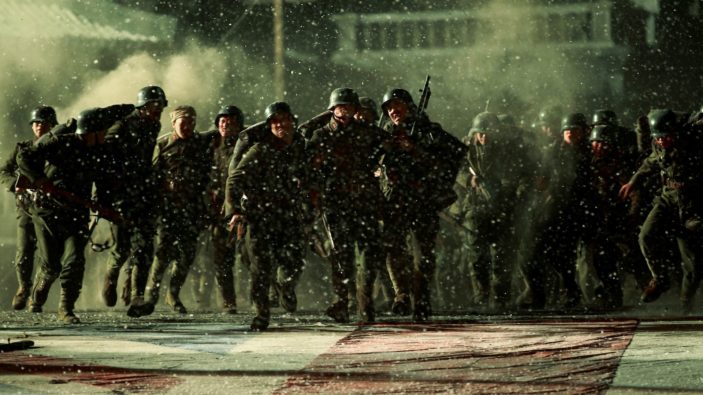
We’re twenty minutes into Hu Guan‘s epic The Eight Hundred before the credits cease on screen. Then the film informs us that we are on Day 1 of what is to be a four-day siege – not to mention a further 2 hours in its running time.
The titular Eight Hundred refers to the 400 defending soldiers of China’s National Revolutionary Army who held out against the Japanese during the Second World War in 1937; their leader, Col. Xie (Du Chun) embellished the numbers in a bid to confuse his attackers. It’s one of the more odd historical moments as the battle ground was predominantly a large warehouse in an overrun area of Shanghai, located not far from civilians who could easily watch the attacks taking place without fear for their own safety.
As unique as the situation on display is, at its core The Eight Hundred is not unlike the more traditional war films we’ve seen out of the United States or the United Kingdom, with heroism, sacrifice, and oft ill-prepared soldiers who act on their duty to their country with a bold dedication. It’s perhaps with this mentality that the film will no doubt hope to extend to audiences beyond the Chinese market, though having it already totalled $280 million gross in China alone certifies it as a success regardless of an international response.
As investing at times the film proves to be – and opposing that are several scenes of overt symbolism involving a white stallion that may be just a little too on the nose – it’s the struggle The Eight Hundred has found in earning a cinematic placement that is perhaps the film’s most interesting aspect. Originally set to premiere last year at the Shanghai Film Festival, it was unexpectedly pulled at the last minute due to “consultation between the production team and other entities”. Word abound that the Communist govern of China didn’t agree with what the film portrayed and swiftly canned any viewings. Given that the film has now seen the light of day – a film 10 years in the making and the first Chinese production to be shot entirely on IMAX cameras to boot – and been beyond a success, it seems fair to deduct that any political motivation did little to dim the nation’s enthusiasm.
Whilst the cut in cinemas now is slightly trimmed from its original running time, it’s difficult to imagine too much has been altered as it maintains its sense of grandiose and ambition, whilst somehow never taking any grand risks to render it entirely unique. Emotions still run high though, even with soldiers from a distant land, solidifying The Eight Hundred as an entertaining, thought at times taxing, experience that succeeds at once as being a distinctive yet conventional entrant in the war film genre.
![]()
![]()
![]()
![]()
![]()
THREE STARS (OUT OF FIVE)
The Eight Hundred is currently screening in most Australian cities in select cinemas.
